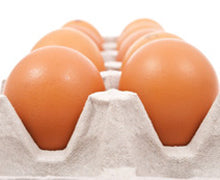
If you look closely at the cartons in which eggs are sold at the store you will see some have higher levels of vitamins or essential fatty acids. And that's because of the diet the hens are fed. Researchers at Newcastle University in England studied preparation methods and determined scrambled or poached eggs allow you to retain the most vitamin D during the cooking process.
Eggs are a good source of vitamin D and when given the right diet, hens can produce eggs with an even higher vitamin D content. But if you are concerned with getting more vitamin D in your diet, you could be defeating your efforts with the way you cook your eggs.
Newcastle scientists concerned with how low levels of vitamin D affect human heath used vitamin D-enriched eggs from the Happy Egg Company for their experiment. Vitamin D is important for bones, teeth, and muscles and it vital for strong immunity.
Researchers looked at different cooking methods to determine which are best for vitamin D retention.
"We found that if you want to retain more of the vitamin D in your eggs then you are better to keep them out of the fridge at ambient temperature, such as on the kitchen worktop," nutrition professor Tom Hill said. "And when it comes to the cooking method, scramble or poach them is best to retain most of the vitamin."
Researchers tested the levels of vitamin D in uncooked eggs and then developed a ratio of vitamin D based on the weight of the egg. They then checked the vitamin D levels of cooked eggs. Without adjusting the weight ratio for water lost from the egg during cooking they found the eggs retained between 78 and 109 percent of their original vitamin D to weight ratio.
Scrambled eggs came in highest at 109 percent, followed by poached eggs at 93 percent. Hard boiled eggs retained 80 of their vitamin D and fried eggs retained 78 percent.
"We know that more than 90% of the British population is not getting enough dietary vitamin D and there is an urgent need to develop foods that will solve this problem," Hill said. "Our previous studies have shown how we can successfully enrich eggs with vitamin D through the hens' diet, which could be a valuable food source in helping to address the widespread problem of deficiency in the UK.
"So now we know, it's not only about the diet the hens are fed that can significantly increase the amount of vitamin D in the egg but the way you cook them that influences how much you are going to be consuming."



